- Home
- Gaston Leroux
Le mystère de la chambre jaune. English Page 15
Le mystère de la chambre jaune. English Read online
Page 15
CHAPTER XIV. "I Expect the Assassin This Evening"
"I must take you," said Rouletabille, "so as to enable you tounderstand, to the various scenes. I myself believe that I havediscovered what everybody else is searching for, namely, how themurderer escaped from The Yellow Room, without any accomplice, andwithout Mademoiselle Stangerson having had anything to do with it. Butso long as I am not sure of the real murderer, I cannot state the theoryon which I am working. I can only say that I believe it to be correctand, in any case, a quite natural and simple one. As to what happened inthis place three nights ago, I must say it kept me wondering for a wholeday and a night. It passes all belief. The theory I have formed fromthe incident is so absurd that I would rather matters remained as yetunexplained."
Saying which the young reporter invited me to go and make the tour ofthe chateau with him. The only sound to be heard was the crunching ofthe dead leaves beneath our feet. The silence was so intense that onemight have thought the chateau had been abandoned. The old stones, thestagnant water of the ditch surrounding the donjon, the bleak groundstrewn with the dead leaves, the dark, skeleton-like outlines of thetrees, all contributed to give to the desolate place, now filled withits awful mystery, a most funereal aspect. As we passed round thedonjon, we met the Green Man, the forest-keeper, who did not greet us,but walked by as if we had not existed. He was looking just as I hadformerly seen him through the window of the Donjon Inn. He had stillhis fowling-piece slung at his back, his pipe was in his mouth, and hiseye-glasses on his nose.
"An odd kind of fish!" Rouletabille said to me, in a low tone.
"Have you spoken to him?" I asked.
"Yes, but I could get nothing out of him. His only answers are gruntsand shrugs of the shoulders. He generally lives on the first floor ofthe donjon, a big room that once served for an oratory. He lives likea bear, never goes out without his gun, and is only pleasant with thegirls. The women, for twelve miles round, are all setting their caps forhim. For the present, he is paying attention to Madame Mathieu, whosehusband is keeping a lynx eye upon her in consequence."
After passing the donjon, which is situated at the extreme end of theleft wing, we went to the back of the chateau. Rouletabille, pointingto a window which I recognised as the only one belonging to MademoiselleStangerson's apartment, said to me:
"If you had been here, two nights ago, you would have seen your humbleservant at the top of a ladder, about to enter the chateau by thatwindow."
As I expressed some surprise at this piece of nocturnal gymnastics, hebegged me to notice carefully the exterior disposition of the chateau.We then went back into the building.
"I must now show you the first floor of the chateau, where I am living,"said my friend.
To enable the reader the better to understand the disposition of theseparts of the dwelling, I annex a plan of the first floor of the rightwing, drawn by Rouletabille the day after the extraordinary phenomenonoccurred, the details of which I am about to relate.
boudoir ___ ____ ___________ __________ ________4________ _______ _________ __ | | | | | | | | Mlle. | | Mlle. |___ ___ ___| Mr. Lumber |Strangerson's Strangerson's|___ ___ ___|Strangerson's | Room | Sitting | | Bed Room |___ ___ ___| Room | | Room | |__ __ _____|stair-case | | | |bath|anteroom| | |_____ ______|____ ______|___|____|___ ___| |______ _____ | 2 ------ Right Gallery Right Wing--------- 3 Right Gallery Left Wing |_________ _____ _________ ______ _______ __ __ __ _________ _____
|Roulet- | W G | |tabille's | I A | Right Wing Left Wing | Room N L of the |_________ | D L | Chateau Frederic | I E | |Larsan's N R | Room | G Y | | | |____ ____ | _1_ | . 5 . . 6 . . . . . .
Rouletabille motioned me to follow him up a magnificent flight of stairsending in a landing on the first floor. From this landing one could passto the right or left wing of the chateau by a gallery opening from it.This gallery, high and wide, extended along the whole length of thebuilding and was lit from the front of the chateau facing the north.The rooms, the windows of which looked to the south, opened out of thegallery. Professor Stangerson inhabited the left wing of the building.Mademoiselle Stangerson had her apartment in the right wing.
We entered the gallery to the right. A narrow carpet, laid on thewaxed oaken floor, which shone like glass, deadened the sound of ourfootsteps. Rouletabille asked me, in a low tone, to walk carefully, aswe were passing the door of Mademoiselle Stangerson's apartment. Thisconsisted of a bed-room, an ante-room, a small bath-room, a boudoir,and a drawing-room. One could pass from one to another of these roomswithout having to go by way of the gallery. The gallery continuedstraight to the western end of the building, where it was lit by a highwindow (window 2 on the plan). At about two-thirds of its length thisgallery, at a right angle, joined another gallery following the courseof the right wing.
The better to follow this narrative, we shall call the gallery leadingfrom the stairs to the eastern window, the "right" gallery and thegallery quitting it at a right angle, the "off-turning" gallery (windinggallery in the plan). It was at the meeting point of the two galleriesthat Rouletabille had his chamber, adjoining that of Frederic Larsan,the door of each opening on to the "off-turning" gallery, while thedoors of Mademoiselle Stangerson's apartment opened into the "right"gallery. (See the plan.)
Rouletabille opened the door of his room and after we had passed in,carefully drew the bolt. I had not had time to glance round the placein which he had been installed, when he uttered a cry of surprise andpointed to a pair of eye-glasses on a side-table.
"What are these doing here?" he asked.
I should have been puzzled to answer him.
"I wonder," he said, "I wonder if this is what I have been searchingfor. I wonder if these are the eye-glasses from the presbytery!"
He seized them eagerly, his fingers caressing the glass. Then looking atme, with an expression of terror on his face, he murmured, "Oh!--Oh!"
He repeated the exclamation again and again, as if his thoughts hadsuddenly turned his brain.
He rose and, putting his hand on my shoulder, laughed like one dementedas he said:
"Those glasses will drive me silly! Mathematically speaking the thingis possible; but humanly speaking it is impossible--or afterwards--orafterwards--"
Two light knocks struck the door. Rouletabille opened it. A figureentered. I recognised the concierge, whom I had seen when she was beingtaken to the pavilion for examination. I was surprised, thinking she wasstill under lock and key. This woman said in a very low tone:
"In the grove of the parquet."
Rouletabille replied: "Thanks."--The woman then left. He again turnedto me, his look haggard, after having carefully refastened the door,muttering some incomprehensible phrases.
"If the thing is mathematically possible, why should it not behumanly!--And if it is humanly possible, the matter is simply awful." Iinterrupted him in his soliloquy:
"Have they set the concierges at liberty, then?" I asked.
"Yes," he replied, "I had them liberated, I needed people I could trust.The woman is thoroughly devoted to me, and her husband would lay downhis life for me."
"Oho!" I said, "when will he have occasion to do it?"
"This evening,--for this evening I expect the murderer."
"You expect the murderer this evening? Then you know him?"
"I shall know him; but I should be mad to affirm, categorically, at thismoment that I do know him. The mathematical idea I have of the murderergives results so frightful, so monstrous, that I hope it is stillpossible that I am mistaken. I hope so, with all my heart!"
"Five minutes ago, you did not know the murderer; how can you say thatyou expe
ct him this evening?"
"Because I know that he must come."
Rouletabille very slowly filled his pipe and lit it. That meant aninteresting story. At that moment we heard some one walking in thegallery and passing before our door. Rouletabille listened. The sound ofthe footstep died away in the distance.
"Is Frederic Larsan in his room?" I asked, pointing to the partition.
"No," my friend answered. "He went to Paris this morning,--still onthe scent of Darzac, who also left for Paris. That matter will turn outbadly. I expect that Monsieur Darzac will be arrested in the course ofthe next week. The worst of it is that everything seems to be in leagueagainst him,--circumstances, things, people. Not an hour passes withoutbringing some new evidence against him. The examining magistrate isoverwhelmed by it--and blind."
"Frederic Larsan, however, is not a novice," I said.
"I thought so," said Rouletabille, with a slightly contemptuous turnof his lips, "I fancied he was a much abler man. I had, indeed, a greatadmiration for him, before I got to know his method of working. It'sdeplorable. He owes his reputation solely to his ability; but he lacksreasoning power,--the mathematics of his ideas are very poor."
I looked closely at Rouletabille and could not help smiling, on hearingthis boy of eighteen talking of a man who had proved to the world thathe was the finest police sleuth in Europe.
"You smile," he said? "you are wrong! I swear I will outwit him--and ina striking way! But I must make haste about it, for he has an enormousstart on me--given him by Monsieur Robert Darzac, who is this eveninggoing to increase it still more. Think of it!--every time the murderercomes to the chateau, Monsieur Darzac, by a strange fatality, absentshimself and refuses to give any account of how he employs his time."
"Every time the assassin comes to the chateau!" I cried. "Has hereturned then--?"
"Yes, during that famous night when the strange phenomenon occurred."
I was now going to learn about the astonishing phenomenon to whichRouletabille had made allusion half an hour earlier without giving meany explanation of it. But I had learned never to press Rouletabille inhis narratives. He spoke when the fancy took him and when he judged itto be right. He was less concerned about my curiosity than he was formaking a complete summing up for himself of any important matter inwhich he was interested.
At last, in short rapid phrases, he acquainted me with things whichplunged me into a state bordering on complete bewilderment. Indeed, theresults of that still unknown science known as hypnotism, for example,were not more inexplicable than the disappearance of the "matter" ofthe murderer at the moment when four persons were within touch of him. Ispeak of hypnotism as I would of electricity, for of the nature of bothwe are ignorant and we know little of their laws. I cite these examplesbecause, at the time, the case appeared to me to be only explicable bythe inexplicable,--that is to say, by an event outside of known naturallaws. And yet, if I had had Rouletabille's brain, I should, like him,have had a presentiment of the natural explanation; for the most curiousthing about all the mysteries of the Glandier case was the naturalmanner in which he explained them.
I have among the papers that were sent me by the young man, after theaffair was over, a note-book of his, in which a complete account isgiven of the phenomenon of the disappearance of the "matter" of theassassin, and the thoughts to which it gave rise in the mind of my youngfriend. It is preferable, I think, to give the reader this account,rather than continue to reproduce my conversation with Rouletabille; forI should be afraid, in a history of this nature, to add a word that wasnot in accordance with the strictest truth.

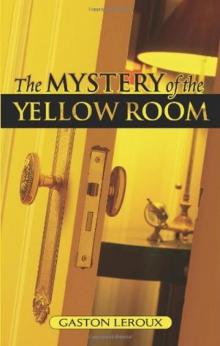 The Mystery of the Yellow Room
The Mystery of the Yellow Room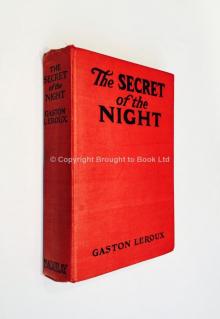 The Secret of the Night
The Secret of the Night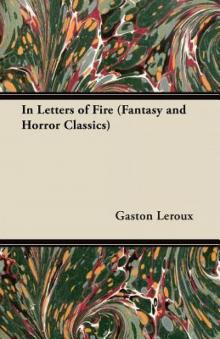 In Letters of Fire
In Letters of Fire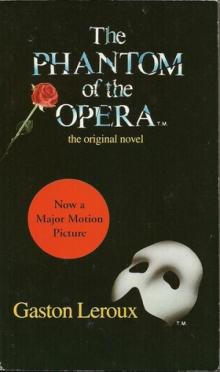 The Phantom of the Opera
The Phantom of the Opera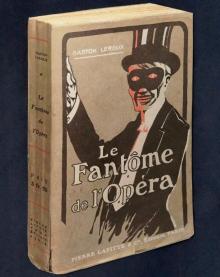 Fantôme de l'Opéra. English
Fantôme de l'Opéra. English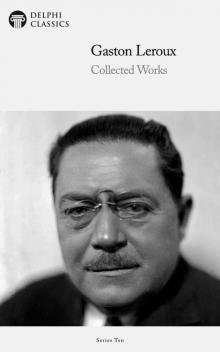 Collected Works of Gaston Leroux
Collected Works of Gaston Leroux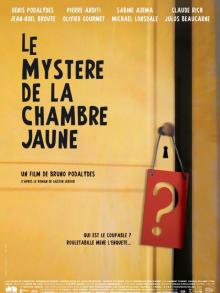 Le mystère de la chambre jaune. English
Le mystère de la chambre jaune. English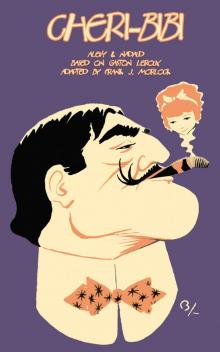 Cheri-Bibi: The Stage Play
Cheri-Bibi: The Stage Play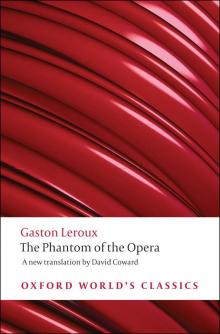 The Phantom of the Opera (Oxford World's Classics)
The Phantom of the Opera (Oxford World's Classics)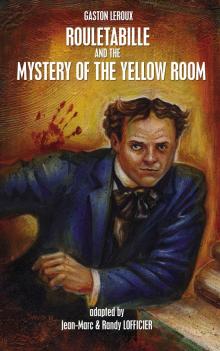 Rouletabille and the Mystery of the Yellow Room
Rouletabille and the Mystery of the Yellow Room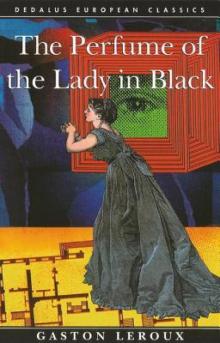 The Perfume of the Lady in Black
The Perfume of the Lady in Black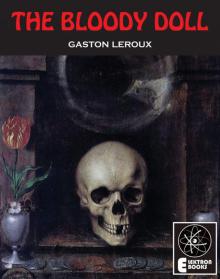 The Bloody Doll
The Bloody Doll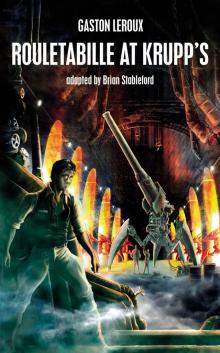 Rouletabille at Krupp's
Rouletabille at Krupp's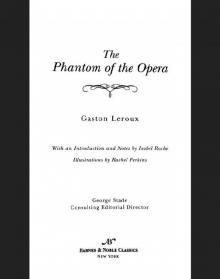 Phantom of the Opera (Barnes & Noble Classics Series)
Phantom of the Opera (Barnes & Noble Classics Series)